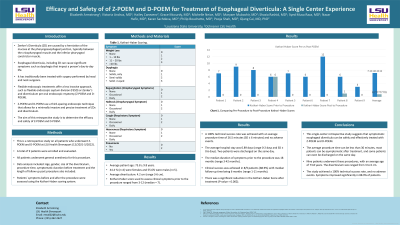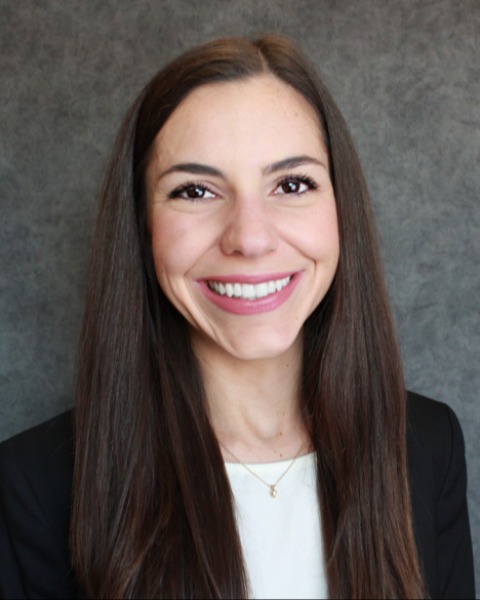Sunday Poster Session
Category: Esophagus
P0410 - Efficacy and Safety of Z-POEM and D-POEM for Treatment of Esophageal Diverticula: A Single Center Experience
Sunday, October 22, 2023
3:30 PM - 7:00 PM PT
Location: Exhibit Hall

Has Audio

Elizabeth Armstrong, BA
LSU Health Sciences Center
Shreveport, LA
Presenting Author(s)
Elizabeth Armstrong, BA, Victoria Andrus, , Hailey Canezaro, MS, Grace McCurdy, , Michelle Neice, MD, Maryam Mubashir, MD, Shazia Rashid, MD, Syed Musa Raza, MD, Nazar Hafiz, MD, Karan Sachdeva, MD, Philip Bouchette, MD, Pooja Shah, MD, Qiang Cai, MD, PhD, MACG
LSU Health Sciences Center, Shreveport, LA
Introduction: Esophageal diverticula, including Zenker’s Diverticula (ZD) can cause significant symptoms that impact a person’s day-to-day life. ZD is caused by a herniation of the mucosa at the pharyngoesophageal junction, typically between the cricopharyngeal muscle and the inferior pharyngeal constrictor muscle. It often presents with significant dysphagia and has traditionally been treated with surgery performed by head and neck surgeons. Flexible endoscopic treatments offer a less invasive approach, such as flexible endoscopic septum division (FESD) or Zenker’s and diverticulum per oral endoscopic myotomy (Z-POEM and D-POEM). Z-POEM and D-POEM use a third-spacing endoscopic technique that allows for a minimally invasive and precise treatment of ZDs and diverticulum. The aim of this retrospective study is to determine the efficacy and safety of Z-POEM and D-POEM.
Methods: This is a retrospective study on all patients who underwent Z-POEM and D-POEM at LSU Health Shreveport (12/2021-5/2022). Patients’ symptoms before and after the procedure were assessed using the Kothari-Haber scoring system. Age, gender, size of the diverticulum, procedure time, symptomatic duration before treatment and the length of follow up post also included. All patients underwent general anesthesia for this procedure.
Results: A total of 9 patients were enrolled. The average patient age ± standard deviation was 73.8 ± 9.8 years. 44.4 % (n=4) were females and 55.6% were males (n=5). The average diverticulum was 4.2 cm (range 3-6 cm). The Kothari-Haber score was used to assess clinical symptoms prior to the procedure and the values ranged from 3-12 (median = 7). A 100% technical success rate was achieved with an average procedure time of 26.5 minutes (SD ± 6 minutes) and no adverse events. The average hospital stay was 0.89 days (range 0-2 days and SD ± 0.6 days). Two patients were discharged on the same day. The median duration of symptoms prior to the procedure was 18 months (range 3-42 months). Clinical success was achieved in 8/9 patients (88.9%) with median follow-up time being 6 months (range 1-11 months). There was a significant reduction in the Kothari-Haber Score after treatment (P-value = 0.002).
Discussion: This single-center retrospective study suggests that symptomatic esophageal diverticula can be safely and effectively treated with Z-POEM and D-POEM. The average procedure time can be less than 30 minutes, most patients can be asymptomatic after treatment, and some patients can even be discharged on the same day.
Disclosures:
Elizabeth Armstrong, BA, Victoria Andrus, , Hailey Canezaro, MS, Grace McCurdy, , Michelle Neice, MD, Maryam Mubashir, MD, Shazia Rashid, MD, Syed Musa Raza, MD, Nazar Hafiz, MD, Karan Sachdeva, MD, Philip Bouchette, MD, Pooja Shah, MD, Qiang Cai, MD, PhD, MACG. P0410 - Efficacy and Safety of Z-POEM and D-POEM for Treatment of Esophageal Diverticula: A Single Center Experience, ACG 2023 Annual Scientific Meeting Abstracts. Vancouver, BC, Canada: American College of Gastroenterology.
LSU Health Sciences Center, Shreveport, LA
Introduction: Esophageal diverticula, including Zenker’s Diverticula (ZD) can cause significant symptoms that impact a person’s day-to-day life. ZD is caused by a herniation of the mucosa at the pharyngoesophageal junction, typically between the cricopharyngeal muscle and the inferior pharyngeal constrictor muscle. It often presents with significant dysphagia and has traditionally been treated with surgery performed by head and neck surgeons. Flexible endoscopic treatments offer a less invasive approach, such as flexible endoscopic septum division (FESD) or Zenker’s and diverticulum per oral endoscopic myotomy (Z-POEM and D-POEM). Z-POEM and D-POEM use a third-spacing endoscopic technique that allows for a minimally invasive and precise treatment of ZDs and diverticulum. The aim of this retrospective study is to determine the efficacy and safety of Z-POEM and D-POEM.
Methods: This is a retrospective study on all patients who underwent Z-POEM and D-POEM at LSU Health Shreveport (12/2021-5/2022). Patients’ symptoms before and after the procedure were assessed using the Kothari-Haber scoring system. Age, gender, size of the diverticulum, procedure time, symptomatic duration before treatment and the length of follow up post also included. All patients underwent general anesthesia for this procedure.
Results: A total of 9 patients were enrolled. The average patient age ± standard deviation was 73.8 ± 9.8 years. 44.4 % (n=4) were females and 55.6% were males (n=5). The average diverticulum was 4.2 cm (range 3-6 cm). The Kothari-Haber score was used to assess clinical symptoms prior to the procedure and the values ranged from 3-12 (median = 7). A 100% technical success rate was achieved with an average procedure time of 26.5 minutes (SD ± 6 minutes) and no adverse events. The average hospital stay was 0.89 days (range 0-2 days and SD ± 0.6 days). Two patients were discharged on the same day. The median duration of symptoms prior to the procedure was 18 months (range 3-42 months). Clinical success was achieved in 8/9 patients (88.9%) with median follow-up time being 6 months (range 1-11 months). There was a significant reduction in the Kothari-Haber Score after treatment (P-value = 0.002).
Discussion: This single-center retrospective study suggests that symptomatic esophageal diverticula can be safely and effectively treated with Z-POEM and D-POEM. The average procedure time can be less than 30 minutes, most patients can be asymptomatic after treatment, and some patients can even be discharged on the same day.
Disclosures:
Elizabeth Armstrong indicated no relevant financial relationships.
Victoria Andrus indicated no relevant financial relationships.
Hailey Canezaro indicated no relevant financial relationships.
Grace McCurdy indicated no relevant financial relationships.
Michelle Neice indicated no relevant financial relationships.
Maryam Mubashir indicated no relevant financial relationships.
Shazia Rashid indicated no relevant financial relationships.
Syed Musa Raza indicated no relevant financial relationships.
Nazar Hafiz indicated no relevant financial relationships.
Karan Sachdeva indicated no relevant financial relationships.
Philip Bouchette indicated no relevant financial relationships.
Pooja Shah indicated no relevant financial relationships.
Qiang Cai indicated no relevant financial relationships.
Elizabeth Armstrong, BA, Victoria Andrus, , Hailey Canezaro, MS, Grace McCurdy, , Michelle Neice, MD, Maryam Mubashir, MD, Shazia Rashid, MD, Syed Musa Raza, MD, Nazar Hafiz, MD, Karan Sachdeva, MD, Philip Bouchette, MD, Pooja Shah, MD, Qiang Cai, MD, PhD, MACG. P0410 - Efficacy and Safety of Z-POEM and D-POEM for Treatment of Esophageal Diverticula: A Single Center Experience, ACG 2023 Annual Scientific Meeting Abstracts. Vancouver, BC, Canada: American College of Gastroenterology.
